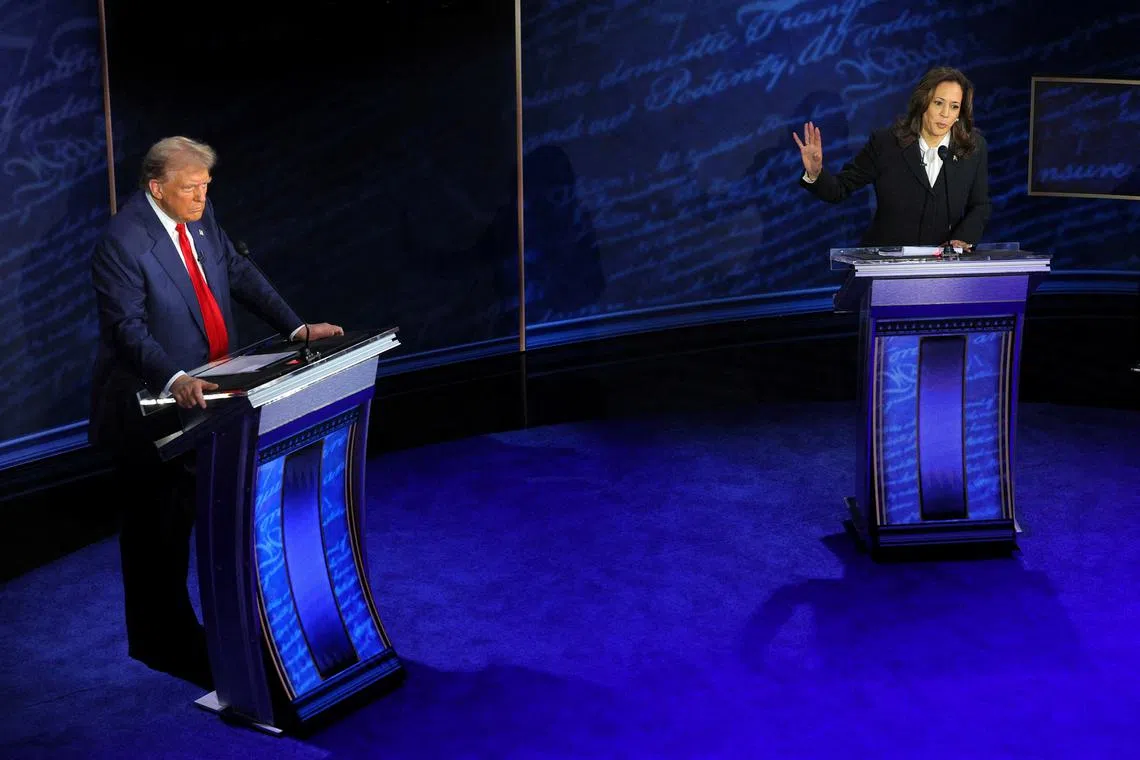Inflation, GDP would be same under Harris or Trump, survey says
Sign up now: Get ST's newsletters delivered to your inbox

The candidates’ economic agendas are very different, so the similar forecasts come as a surprise.
PHOTO: REUTERS
WASHINGTON – The outlook for inflation and growth in the US would be roughly the same whether Ms Kamala Harris or Donald Trump wins the election, though economists in a Bloomberg survey give the US Vice-President the edge on the economy overall.
A popular inflation metric favoured by the Federal Reserve – the personal consumption expenditures (PCE) price index – is expected to rise an annualised 2.2 per cent on average over the next four years under either candidate, according to the survey of 29 economists done from Oct 7 to 10.
The median forecast for gross domestic product (GDP) projects a 2 per cent annualised growth rate on average, no matter who wins.
Both are slightly above the Fed’s long-run estimates, which target 2 per cent PCE inflation and a 1.8 per cent advance in GDP. That is part of the reason why interest rates would stay relatively elevated under either candidate, though economists see lower borrowing costs in a Harris administration compared with Trump.
The candidates’ economic agendas are very different, so the similar forecasts come as a surprise.
Even so, 62 per cent of the surveyed economists expect Ms Harris to pursue a policy agenda that would be more favourable for the long-run outlook for economic growth, jobs and inflation.
The remaining 38 per cent said they expect Trump would perform better in that respect. The biggest concern with Trump’s agenda regards tariffs.
The former president has touted baseline 20 per cent tariffs on all imported goods and as much as 60 per cent if they come from China.
It is expected this would likely cause other countries to impose their own tariffs on US goods, which would drive up inflation and slow economic growth.
Ms Harris and Trump have campaigned to prove to voters concerned about high prices and interest rates that their policies would bolster the economy. Yet neither has fully outlined how they would pay for such programmes, and both would further strain the US’ fiscal problems.
In a Trump presidency, the budget deficit would average US$2.25 trillion (S$2.95 million) over the next four years, compared with US$2 trillion for Ms Harris, the survey respondents said.
The deficit – which measures how much federal spending exceeds revenues – currently stands at around US$1.9 trillion.
Ms Harris’ agenda is generally seen adding less to deficits, given her plan to increase taxes on wealthy individuals and corporations, which some say could help offset costs for policies such as Medicare coverage for home health aides and assistance for first-time home owners.
But some of her programmes could be costly to pay for, including boosting the child tax credit.
Meanwhile, Trump’s plan to extend tax cuts and additional reductions to corporate tax rates could further dampen federal revenue. To make up for that, the Republican campaign plans to reduce spending, boost energy output and rely on tariffs. BLOOMBERG


